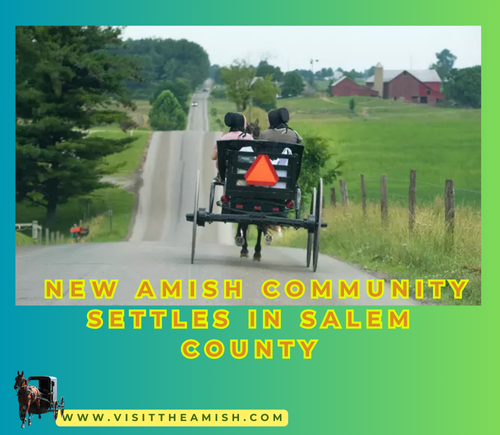Serenity in South Jersey: New Amish Community Settles in Salem County
SALEM COUNTY, NJ – The rolling farmlands of Southern New Jersey have welcomed a new chapter in their history, as a burgeoning Amish community takes root in the quiet countryside of Salem County. Drawn by the promise of fertile land, affordable properties, and a peaceful environment conducive to their traditional way of life, approximately 20 families have established a settlement near the towns of Woodstown and Alloway, marking a significant cultural shift for the region.
The establishment of this Amish community, which began in the spring of 2024, has generated both curiosity and a warm reception from local residents. While the Amish way of life – characterized by simple living, a strong emphasis on faith and family, and a rejection of modern conveniences – may seem anachronistic to some, many in Salem County see their arrival as a welcome return to traditional values and a potential boon for the local economy.
“It’s fascinating to watch them set up their farms and businesses,” says Eleanor Peterson, a long-time resident of Alloway. “They’re incredibly hardworking people, and they bring a sense of community that’s been missing around here for a while. It reminds me of how things used to be.”
The community is led by Bishop Aaron Zook, who previously resided in a larger Amish settlement in Lancaster County, Pennsylvania. “We were looking for a place where we could raise our families in peace and continue to live according to our faith,” Zook explains, his voice carrying a gentle cadence. “Southern New Jersey offered us the land and the opportunity we were seeking.”
Cultivating the Land, Growing the Economy
True to their heritage, the Amish families in Salem County are primarily engaged in agriculture. They have quickly transformed fallow fields into productive farmland, growing a variety of crops, including vegetables, fruits, and grains. Their commitment to sustainable farming practices and high-quality produce has already attracted attention from local consumers and businesses.
“Their produce is incredible,” says Michael DeFilippis, chef and owner of “The Farmhouse,” a popular farm-to-table restaurant in nearby Mullica Hill. “The freshness and flavor are unmatched. We’re excited to partner with them and feature their ingredients on our menu.”
Several Amish families have also established small businesses catering to both the Amish and non-Amish communities. A woodworking shop, specializing in handcrafted furniture and cabinetry, has opened near Woodstown, attracting customers from across the region. Another family operates a small bakery, selling homemade bread, pies, and cookies at a roadside stand.
“The craftsmanship is just amazing,” says Susan Carter, a resident of Woodstown who recently purchased a custom-made dining table from the Amish woodworking shop. “You can tell it’s made with care and attention to detail. It’s a piece that will last for generations.”
Discover the Dutch Wagon Amish Farmers Market in Medford, South Jersey, known for its delicious homemade comfort food and unique vendors.

Local Businesses Welcome New Neighbors
The influx of Amish families has also been a welcome development for existing local businesses. The increased population has brought new customers to local stores and restaurants, providing a much-needed boost to the economy.
“We’ve definitely seen an increase in business since they arrived,” says Tom Black, owner of the Alloway General Store. “They’re regular customers, and they’re always friendly and polite. They’ve become a part of our community.”
Some local farmers have also found opportunities to collaborate with the Amish community. They provide supplies and services to the Amish farmers, building mutually beneficial relationships.
“We help each other out,” says Robert Smith, a local dairy farmer. “They buy hay and feed from me, and I help them with equipment repairs. It’s a good partnership.”
Integration and Adaptation
While the Amish are known for their adherence to traditional ways, they are also pragmatic and willing to adapt to local circumstances when necessary. They have worked with local authorities to ensure their horse-drawn buggies can safely navigate the roadways, installing reflective markings and lights on their vehicles.
“Safety is our top priority,” says Chief David Jones of the Woodstown Police Department. “We’ve worked closely with the Amish community to address any concerns and ensure the safety of everyone on the road.”
The community is also learning about local customs and regulations, attending town meetings and participating in community events.
“We want to be good neighbors,” says Zook. “We respect the laws and customs of this land, and we’re committed to contributing to the well-being of the community.”
Education and Community
Education is highly valued within the Amish community. They have established a one-room schoolhouse where children receive instruction in reading, writing, arithmetic, and other essential skills. The curriculum is tailored to prepare children for a life of faith and service within their community.
“We want our children to be educated and prepared for the future,” says Sarah Lapp, the schoolteacher. “We teach them the skills they need to succeed in life while instilling in them a strong sense of faith and community.”
The schoolhouse also serves as a gathering place for community events and celebrations.
A Future of Harmony
As the Amish community in Salem County continues to grow, both Amish and non-Amish residents express optimism about the future.
“I think they’re a great addition to our community,” says Peterson. “They bring a sense of peace and tranquility that’s refreshing in today’s world. I hope they stay here for many years to come.”
Zook shares this sentiment. “We’re grateful for the warm welcome we’ve received,” he says. “We believe we can live here in harmony with our neighbors, sharing our traditions and contributing to the prosperity of this community.”
In the quiet farmlands of Salem County, a new chapter is unfolding, one that celebrates tradition, community, and the enduring power of faith. The arrival of the Amish community promises to enrich the region’s cultural landscape and strengthen its connection to its agricultural roots.
SE

